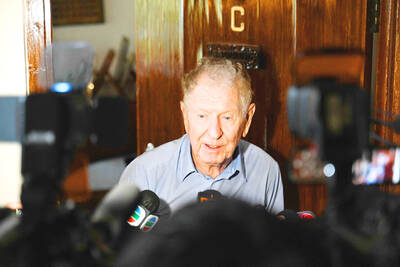Democratic Progressive Party (DPP) and pan-blue politicians exchanged lawsuits yesterday over political donations.
Presidential Office Secretary-General Chiou I-jen (
"Mr. James Soong and others still cannot offer any evidence to prove that the Presidential Office is a center for `black gold' politics, so I am filing a lawsuit against them on behalf of the Presidential Office," Chiou said.
The six politicians are People First Party (PFP) Chairman James Soong (宋楚瑜), PFP legislators Liu Wen-hsiung (劉文雄) and Lin Yu-fang (林郁方), and Chinese Nationalist Party (KMT) Legislators Lee Chuan-chiao (李全教), Chu Fong-chi (朱鳳芝) and Huang Chao-shun (黃昭順).
On Wednesday, Chiou demanded the blue camp apologize or show proof of their allegation, or face a lawsuit. But the politicians rejected the demand.
Chiou's deputy, Chen Che-nan (陳哲男), also filed lawsuits against Lee Chuan-chiao and PFP Legislator Lee Tung-hao (李桐豪) for libel, demanding NT$50 million as compensation. DPP Legislator Chang Ching-fang (張清芳) filed a lawsuit against Lee Tung-hao for libel as well.
Chen said, "Lee Chuan-chiao held a press conference to accuse me of handling illegal money, and that someone gave NT$20 million to dine with me in the Presidential Office. But this is not a fact. I did not see Chang Min-chiang (章民強)," Chen said.
Chang Min-chiang is chairman of the Pacific Sogo Department Stores.
"Lee Tung-hao also said that I had an apartment worth NT$60 million in Kaohsiung, and it is not true either. Both accusations have damaged my reputation," Chen said.
Countering the DPP's lawsuits, the PFP legislative caucus filed lawsuits against Chiou, accusing him of making malicious accusations against PFP politicians.
The PFP caucus said the Presidential Office was only shifting the focus to cover up the issue of the top officials taking illegal donations and no one has yet to clear up the matter.
Huang Shan-shan (
"With the Presidential Office charging PFP politicians with public insult to a public office, does that mean the Presidential Office's duty included taking money and interfering with the management of private enterprises?" Huang asked.
Meanwhile, Lee Chuan-chiao disappeared yesterday, although he accepted a phone interview with the media. Lee refused to disclose his whereabouts and said it was because he had received too many threats in the past few days.
Pacific Construction Co (太平洋建設) issued a statement two days ago saying that there was a top official at the Presidential Office involved in the management transfer of Pacific Sogo, but its chairman, Chang Min-chiang, never went to the Presidential Office to meet anyone, and never spent NT$20 million to meet Presidential Office officials.
According to Pacific Construction, the money, instead, was given by Mingyang Development Company (明陽開發公司), but Pacific Construction refused to explain where the money went.
Lee Chuan-chiao then alleged that it was Chang Min-chiang's son, Chang Chi-min (章啟民), who went to the Presidential Office to see Chen Che-nan. Lee Chuan-chiao said that Chang Min-chiang went to see him to talk about the matter on Monday, accompanied by four friends.
Lee Chuan-chiao urged Chang Min-chiang not to deny anything, threatening to reveal the names of the four friends, who he said were all respected and well-known figures.

US PUBLICATION: The results indicated a change in attitude after a 2023 survey showed 55 percent supported full-scale war to achieve unification, the report said More than half of Chinese were against the use of force to unify with Taiwan under any circumstances, a survey conducted by the Atlanta, Georgia-based Carter Center and Emory University found. The survey results, which were released on Wednesday in a report titled “Sovereignty, Security, & US-China Relations: Chinese Public Opinion,” showed that 55.1 percent of respondents agreed or somewhat agreed that “the Taiwan problem should not be resolved using force under any circumstances,” while 24.5 percent “strongly” or “somewhat” disagreed with the statement. The results indicated a change in attitude after a survey published in “Assessing Public Support for (Non)Peaceful Unification

The CIA has a message for Chinese government officials worried about their place in Chinese President Xi Jinping’s (習近平) government: Come work with us. The agency released two Mandarin-language videos on social media on Thursday inviting disgruntled officials to contact the CIA. The recruitment videos posted on YouTube and X racked up more than 5 million views combined in their first day. The outreach comes as CIA Director John Ratcliffe has vowed to boost the agency’s use of intelligence from human sources and its focus on China, which has recently targeted US officials with its own espionage operations. The videos are “aimed at

‘MISGUIDED EDICT’: Two US representatives warned that Somalia’s passport move could result in severe retaliatory consequences and urged it to reverse its decision Minister of Foreign Affairs Lin Chia-lung (林佳龍) has ordered that a special project be launched to counter China’s “legal warfare” distorting UN Resolution 2758, a foreign affairs official said yesterday. Somalia’s Civil Aviation Authority on Wednesday cited UN Resolution 2758 and Mogadishu’s compliance with the “one China” principle as it banned people from entering or transiting in the African nation using Taiwanese passports or other Taiwanese travel documents. The International Air Transport Association’s system shows that Taiwanese passport holders cannot enter Somalia or transit there. The Ministry of Foreign Affairs (MOFA) protested the move and warned Taiwanese against traveling to Somalia or Somaliland

Four former Hong Kong opposition lawmakers jailed in the territory’s largest national security case were released yesterday after more than four years in prison, the first among dozens convicted last year to regain their freedom. Former legislators Claudia Mo (毛孟靜), Jeremy Tam (譚文豪), Kwok Ka-ki (郭家麒) and Gary Fan (范國威) were part of a group of 47 public figures — including some of Hong Kong’s best-known democracy advocates — who were charged with subversion in 2021 for holding an informal primary election. The case fell under a National Security Law imposed on the territory by Beijng, and drew international condemnation and warnings